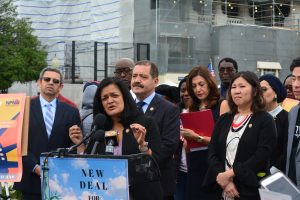Democratic members of Congress this week introduced legislation to streamline the naturalization process and establish grants to provide immigrants and refugees with legal services and ESL programs. Rights activists said the community has to be more proactive in the face of the Trump Administration’s “anti-immigrant rhetoric.”
“This is part of a strategy looking to next year’s [Congressional and Presidential] elections,” said Gustavo Torres, executive director of CASA de Maryland, a Latino community organization in suburban Washington, D.C. “It will mean greater participation in civic society in the country and help ensure that we have a new administration that is more welcoming to immigrants.”
One of the proposals under the New Deal for New Americans Act will make it easier for newly naturalized citizens to register to vote. It’s similar to “motor voter” laws in several states, where residents register to vote or renew their voter registration at the same time they obtain or renew a driver’s license.
The legislation will establish a National Office on New Americans and reverse what supporters of this bill say is a disturbing trend.
Rep. Jesús “Chuy” García (D-IL).
“The New Deal for New Americans Act upholds our commitment and values as a nation that welcomes immigrants,” said Rep. Jesús “Chuy” García (D-IL). “While the Trump administration continues to attack us, we are building the systems to help immigrants succeed because it’s the right thing to do. It’s time to tear down the ‘Second Wall’ of roadblocks to citizenship …and build a humane immigration system for all.”
The legislation would also eliminate the Trump’s so-called “public charge” rule, which would make it more difficult for immigrants to obtain legal residency if they appear to need public assistance. That rule is currently being challenged in court. The bill would also limit the deportation of certain legal permanent residents on public assistance. The Trump administration is seeking to expand the category of low-income immigrants who can be deported. Current law U.S. law allows for the deportation of immigrants who become “public charges” within five years after being admitted into the United States if their reason for seeking assistance happened before entering the United States – such as not disclosing a chronic illness, but that law is rarely enforced. 
Rep. Pramila Jayapal (D-WA)Supporters of the bill, including Basma Alawee of the Miami-based Florida Immigration Coalition, say it is a fallacy to think that immigrants do not contribute to the U.S. economy.
“Immigrants and their U.S born children together represent more than one of four people living in this country. Why wouldn’t we want to help them drive the economy forward,” tweeted the coalition.
Florida is home to nearly four million foreign-born residents, making it the fourth-largest state in terms of immigrants. Among major cities, Miami is number one.
The bill also lowers the fees immigrants would have to pay to naturalize – currently they are charged nearly $800 just for the naturalization application.
“It’s time for a new vision for America—one that fulfills Lady Liberty’s promise, honors our values as a diverse and welcoming nation, and engenders solutions that allow new Americans to truly belong, fully contribute and achieve the American Dream,” said Steve Choi, Executive Director of the New York Immigration Coalition, an organization that represents more than 200 immigrant groups in New York.
The legislation now heads to the House Judiciary Committee for consideration.
































